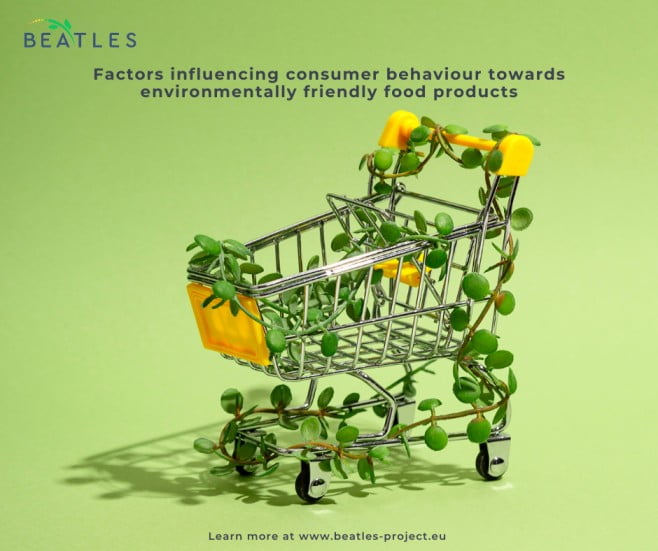The way we produce and consume food has a significant impact on the environment and surrounding society. Therefore, global environmental challenges demand to change the way many agri-food systems currently operate, and to shift consumers to more sustainable behaviours, resulting in more sustainable food choices, and potentiates the need to change policies to protect human and planetary health. To do so, behavioural shifts of all involved stakeholders are needed to foster the adoption of climate smart agriculture (CSA), including smart farming technologies. The Intergovernmental Panel on Climate Change demonstrate that changes to consumers diets can substantially slash greenhouse gas emissions. To facilitate this change, it is necessary to understand the factors that influence consumer behavior towards environmentally friendly food products. The following outcomes are based on a systematic literature review conducted during the first months of the BEATLES project, which aimed to map these factors.
Socio-demographic factors:
To understand consumer behavior and the factors that encourage or inhibit sustainable food choices and purchase behavior, we considered the consumers’ point of view. The systematic review revealed that older consumers, men, consumers with lower education and income, and those living in areas with lower awareness of health and environmental concerns are less likely to adopt an environmentally friendly diet. However, household size does not have a statistically significant effect on the consumption of environmentally friendly food.
Psychological factors:
The systematic review identified knowledge as a crucial factor influencing the consumption of environmentally friendly foods. Consumers who possess relevant knowledge are more likely to make environmentally friendly choices as they are aware of environmental challenges, hold pro-environmental attitudes and beliefs, and prioritize environmental and health concerns in their lifestyles. The review also found that individuals who are accustomed to buying environmentally friendly products and those open to new experiences are more likely to engage in the consumption of environmentally friendly food products. Other psychological factors influencing consumer behavior include perceived behavioral control, subjective norms, trust, and brand sensitivity.
Product characteristics:
Product-related information, such as claims, certifications, and details about the origin, environmental impact of production, and animal welfare, can increase the likelihood of purchasing environmentally friendly products. Additionally, factors such as lower price, longer expiry date, appealing taste and appearance, perception of naturalness, high quality, and food safety contribute to consumer willingness to pay for environmentally friendly products.
Eating and buying context:
The context in which consumers eat and make purchasing decisions also influences their behavior. Factors such as convenience, availability, and accessibility of environmentally friendly food products affect consumer purchase intentions, with availability being the most crucial factor. When local markets or supermarkets offer a wide range of environmentally friendly products, consumers are more likely to choose them.
Systemic factors:
Social norms play an important role in influencing consumer behavior towards environmentally friendly food choices. Friends and family, in particular, have a significant impact on consumers’ decision-making process. Additionally, advertising, promotion, and information from various sources about the importance of environmentally friendly foods positively influence consumption.
Policy factors:
Government actions that support the growth and accessibility of environmentally friendly food, as well as actions that enhance consumer awareness and trust, can affect consumer willingness to purchase such products.
Recommendations:
Based on these findings, we recommend implementing policies and strategies that aim to:
- Educate consumers about the environmental and health benefits of environmentally friendly products.
- Promote and encourage environmentally friendly consumption behavior as a social norm through various channels.
- Ensure better availability and accessibility of environmentally friendly products.
- Stimulate demand for environmentally friendly foods through marketing campaigns that demonstrate their value for money.
- Help consumers make informed choices by implementing a labeling system that provides transparent information about products, ingredients, and their environmental and health impact.
- Offer tax incentives for sustainable practices and government subsidies for climate-smart agricultural producers to lower the cost of environmentally friendly food products, making them more affordable for consumers, financially appealing for businesses, and resulting in increased production and availability.


